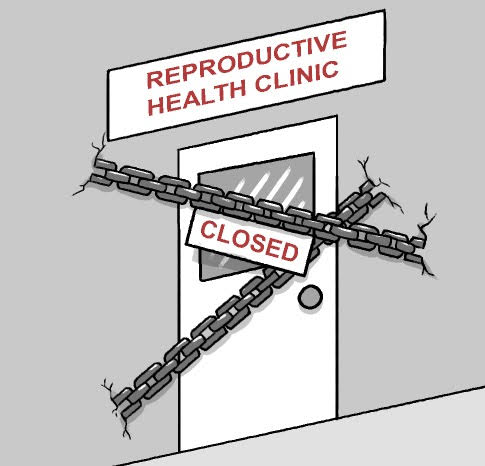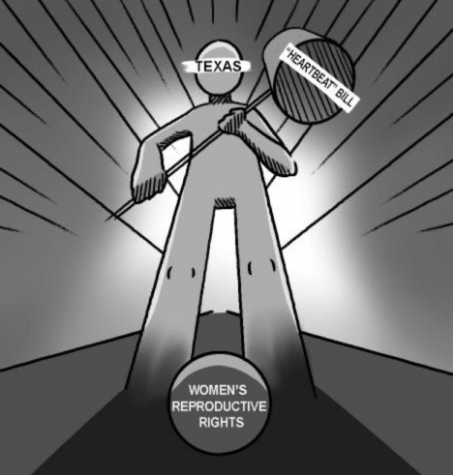Latin Students Speak Out Against Texas Abortion Ban

On September 1, 2021, the most restrictive abortion legislation in the country went into effect, banning approximately 85% of abortions in Texas with no exceptions for rape or incest.
To high school seniors thinking about applying to college in Texas next year, you may want to reconsider. On September 1, 2021, the most restrictive abortion legislation in the country went into effect, banning approximately 85% of abortions in Texas with no exceptions for rape or incest.
The Fetal Heartbeat Act, SB8, restricts abortions as soon as an embryonic heartbeat can be detected by a sonogram, which is typically around six weeks, at which point many women don’t even know they are pregnant. It can take many women several more weeks to know they are pregnant.
What is particularly dangerous to people in Texas, and to students thinking about going to college in Texas, is that the citizens are, in part, the enforcers of the law and can go after anyone who “aids and abets” a woman seeking an abortion. Not only should women be worried that they can’t access an abortion, but any person in Texas needs to be concerned about their liability for helping somebody get an abortion. What is additionally sneaky and vicious about this law is that by using private citizens as vigilante enforcers, it creates mob justice. Women will be too intimidated to seek help, and others will be too intimidated to offer help to women looking to terminate a pregnancy. People with no relationship whatsoever to the patient or the reproductive health clinic can sue any person who helps a woman in any way to obtain an abortion for a minimum of $10,000.
The current U.S. Supreme Court, in a 5-4 vote, refused to intervene to prevent this law from taking effect, notwithstanding last minute petitions to do so. The law was written carefully to avoid Supreme Court action, at least initially, because there were no state actors for the Supreme Court to stop, only potential acts of private citizens. By deputizing private citizens rather than government officials, the Texas law creates a way around the federal court intervening in advance of the law going into effect.
Some students at Latin say they are scared and disgusted; some say they will no longer consider attending school in Texas.
Junior and co-head of Latin’s Intersectional Feminist Alliance Madison Vanderbilt weighed in. “America has always found a way for women’s bodies to not be their own,” she said. “Yet now, this is different. Texas is now putting the control of women’s bodies in the hands of its citizens. Texas unleashed a militia to do its bidding.” Madison said she is also worried that the law will spread to other states. “It’s disheartening to know that there are only going to be more citizen armies to come unless the Supreme Court decides to act.”
Sophomore Gideon Heltzer shares Madison’s viewpoint. “I believe that the Texas ‘heartbeat law’ is immoral,” Gideon said. “It is almost impossible to know if you are pregnant at that time, and it robs women of their own bodily sovereignty.”
Associate Supreme Court Justice Sonya Sotomayor issued a scathing dissent of the court’s inaction. “The Court’s order is stunning. Presented with an application to enjoin a flagrantly unconstitutional law engineered to prohibit women from exercising their constitutional rights and evade judicial scrutiny, a majority of Justices have opted to bury their heads in the sand. … The Court silently acquiesced in a State’s enactment of a law that flouts nearly 50 years of federal precedents. … The Court’s failure to act rewards tactics designed to avoid judicial review and inflicts significant harm on the applicants and on women seeking abortions in Texas.”
The Supreme Court majority was careful to make clear that their silence was not a decision about the constitutionality of the law. That said, for now the abortion ban remains in place in Texas. Reproductive health clinics are simply not able to take the risk of treating patients who are more than six weeks pregnant. These patients must be turned away.
“I am a strong women’s rights activist, and I believe that these laws are the first step in taking away any freedom that women in this country have,” said junior Carmen Pastrana. “It took decades and decades for women to reach the point of respect that we now have, and even now we have barely scratched the surface in the amount of respect we deserve as women. The freedom and respect women have in this so-called ‘free country’ is simply being taken out from under us as we are given little to no voice in this matter and the governments decide what, when, and how we should deal with our own bodies.”
Senior Naomi Altman shares Carmen’s concerns. “I was completely bewildered by the new abortion law. Six weeks is far too early as it is before some people even know that they are pregnant. I also take issue with the fact that it opens the door for citizens to sue abortion providers and people who seek abortion. It turns these people who are in desperate need of help into targets, which is just plain wrong,” said Naomi. “Many people have been saying this, but this abortion law shows how women’s rights are being stolen out from under us. People scream and shout about their gun and choice of masking rights being taken away but have no problem taking away a woman’s right to bodily autonomy. In my opinion, no one has the right to tell me what I can do with my body now or in the future.”
The future of Roe vs. Wade, however, is far from certain under the new majority-conservative Supreme Court. This October, the Supreme Court will be hearing a case about the Mississippi 15-week ban on abortion. The Supreme Court may at that time overturn Roe. Texas was not waiting to see how the Supreme Court eventually rules on Roe. Instead, Texas’ Fetal Heartbeat Act’s goal was to get rid of abortion in spite of Roe.
The U.S. Department of Justice isn’t waiting either until the Supreme Court hears and decides the Mississippi case. U.S. Attorney General Merrick Garland brought suit last week in federal court in Austin against the State of Texas, challenging the constitutionality of the Texas ban and seeking to declare the ban invalid. “The act is clearly unconstitutional,” Garland said, announcing the lawsuit. Additionally, on September 14, the Department of Justice asked a federal judge to block enforcement of the law. Nobody knows if the Justice Department will be successful in this challenge or what the Supreme Court will later rule, so for now, Texas is the most restrictive state on abortion in the country.
Consequently, many of the everyday things people take for granted in college are now a danger. Beyond the obvious, imagine there are three roommates; one roommate is pregnant and seeks the second roommate’s help. The third roommate overhears and later sues the second roommate for $10,000.
Perhaps you’ve taken a part-time job driving an Uber or a Lyft, and you give someone a ride to a clinic where she is having an abortion. Then one of your co-drivers or classmates turns you in and sues you for $10,000.
Maybe you’re staffing a student crisis line and advise a woman in crisis on how to get an abortion and the neighboring person at the crisis line overhears you and sues you for $10,000.
Maybe you loan somebody money to assist them in paying for an abortion, you get turned in, and then sued for $10,000.
This sounds like it’s out of a dystopian novel, but it’s real. There are whistleblower websites popping up in Texas to provide anonymous tips about who’s helping women get abortions.
For these reasons, says Carmen Pastrana, it is unlikely that she and others would apply to college in Texas. “Before these laws ever came into effect,” Carmen said, “I had little desire to go to school in Texas, let alone the South in general, just because I grew up in Georgia and never appreciated the political climate there. But these new laws really do take away any sense of security that a female college student deserves and should receive from her national government and those representing her in office.”
Senior and co-head of Latin’s Intersectional Feminist Alliance Jane Baer won’t be looking in Texas, either. “It’s terrifying that Texan women are now stripped of such a life-altering decision by the government, turning the issue into a political stance rather than a right for a woman to have agency over her own body,” Jane wrote. “I can imagine this law also setting off other states with anti-abortion-leaning environments to follow. I wasn’t planning on ever really looking into Texas colleges, but knowing the restrictions this law has placed on a woman’s livelihood, I wouldn’t feel completely safe and respected as a human if I were to ever live in Texas.”
Junior Evan Jones said, “I think that the Texas abortion ban is a different level of problematic. Generally, I have found that in some abortion-related debates I can somewhat understand the pro-life argument, but in this case I think the law is simply draconian.”
Latin College Counselor Alexandra Fields said, “It will be interesting to see what the impact is of the current law passing in Texas, and if it’s something students take into consideration in their process.”
Texas’ abortion ban will affect all women but will hit low-income women, immigrants, and minors most severely. Women will be forced to carry a pregnancy to term or travel out of state at considerably greater expense. Anti-choice activists have been working toward this outcome for decades. Until now, the U.S. Supreme Court has stood in their way, enforcing Roe. SB8 eliminates most abortions in spite of Roe. Women will be forced to carry unwanted pregnancies to term, and even attempting to help them could result in exposure to vigilante bounty hunters.
According to Maggie Astor of the New York Times, the law potentially could reach people outside the state. It is possible that “residents of other states can sue someone who helps a Texan get an abortion and it is possible they could also be sued for helping a Texan get an abortion.” That’s right; even if you choose not to go to college in Texas but you help a woman in Texas, you may be vulnerable.
Junior Anna Hynes said, “The ‘pro-life’ people who created and will enforce this law really only care about one thing: controlling women and their bodies.” Anna said she would also be discouraged from applying to college in Texas. “While I am lucky to have parents who would support me and help me, whatever my choice would be, I think this law will definitely discourage me from thinking about applying to college in Texas. Just the fact that this law was even able to be passed there is scary and speaks to the general culture there, even if some of Texas isn’t like that.”
Senior Sam Gibson agrees. “I think this situation is awful and completely unfair to the women affected,” he said.

The Forum sought out pro-life perspectives but couldn’t find any students willing to comment.
Dr. Angela Chaudhari, a Latin parent and chief of gynecology and gynecologic surgery at Northwestern, is concerned as well. “The most important thing to consider … is the reasoning behind this law,” said Dr. Chaudhari. “Lawmakers in Texas say it is about protecting life. Instead, a law like this will undoubtedly make early pregnancy care more dangerous for women in a state that ranks in the top 10 for maternal mortality (deaths due to pregnancy) in our country. It is aimed at taking away choice from women in their personal health care instead of providing opportunities for counseling and exploration of their choices.”
Dr. Chaudhari also emphasized the law’s disproportionate impact on low-income women. “Low-income women already have less access to general health care and contraceptive services, potentially putting them more at risk for an undesired pregnancy. Now, with this law in place, they will also have less choice in their health care options and be forced to carry a pregnancy,” she said.
Unlike Texas, Illinois is a leader in protecting women’s reproductive rights, including guaranteeing coverage for abortion and contraceptive services to low-income women. The state has laws in place to guarantee women’s reproductive rights if Roe is overturned, thanks to former Governor Bruce Rauner and current Governor J.B. Pritzker. Maybe high school students in Texas should be looking at colleges in Illinois.

Matthew Kotcher ('23) is thrilled to continue to serve on The Forum as the Arts Editor and now as Director of Staff Recruitment and Development. Matthew,...























































